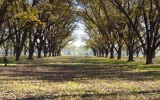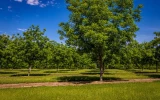How Long Do Pecan Trees Produce Nuts on Average?
It takes a long time for a pecan tree to mature and start producing nuts. But once it does, it can produce a significant amount of nuts each year. So, for how long can you expect your pecan tree to keep producing nuts? Let's answer that in this article.
A pecan tree can produce nuts for around 20–30 years. Some can produce nuts for years, while others may only produce them for a few decades. The lifespan of a pecan tree is about 60 years, so most trees will produce nuts for at least part of their lives.
Several factors can affect the nut production of pecan trees, such as the age of the tree, the variety of pecan trees, and environmental factors such as water, rain, temperature, weather, sunlight, and shade. As you go through this article, we'll discuss how each of these factors can affect how long pecan trees can produce nuts.
Summary
- The Desirable variety is known for its large and well-filled nuts, reliable bearing habits, and excellent flavor profile, with nut production estimated to continue until the tree reaches an age of 80 to 90 years.
- The Pawnee variety is celebrated for its early maturity and abundant harvests, with the capability to produce nuts at a relatively young age and remain productive for 50 years or more.
- The development and release of pecan varieties, such as the Cape Fear cultivar, by the USDA Pecan Breeding Program demonstrate ongoing efforts to improve pecan tree adaptability, disease resistance, and nut quality
- Young pecan trees, typically between 1 and 20 years old, exhibit high nut production, with an estimated yield of 4000 lbs per tree, while old pecan trees, aged 51 years and older, show a decline in nut production (1000 lbs per tree).
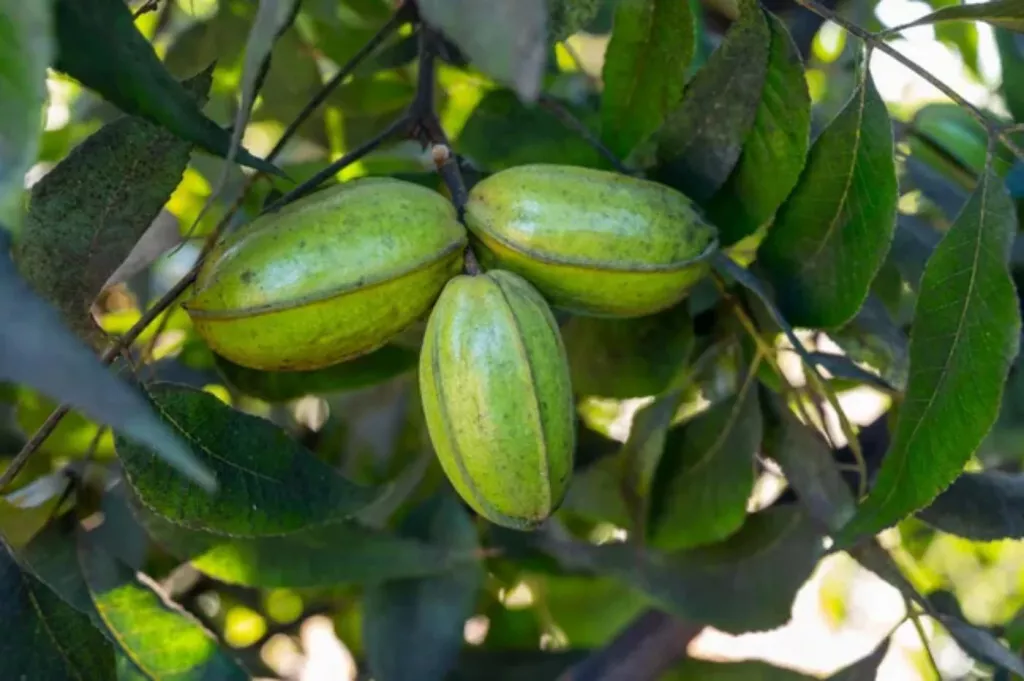
Pecan Trees Can Produce Nuts for Up to 30 Years
In general, a pecan tree will produce nuts for around 20 to 30 years. However, the yield of nuts varies depending on the cultivar, seedling, and the tree's age.
Pecan trees are native to North America and are grown for their nuts, which are rich in nutrients and have a distinct flavor. These trees can grow up to 100 feet tall and have a broad, spreading canopy.
These trees are long-lived, and some can produce nuts for more than 100 years. However, the average lifespan of a pecan tree is around 60 years, and their nut production decreases as they age.
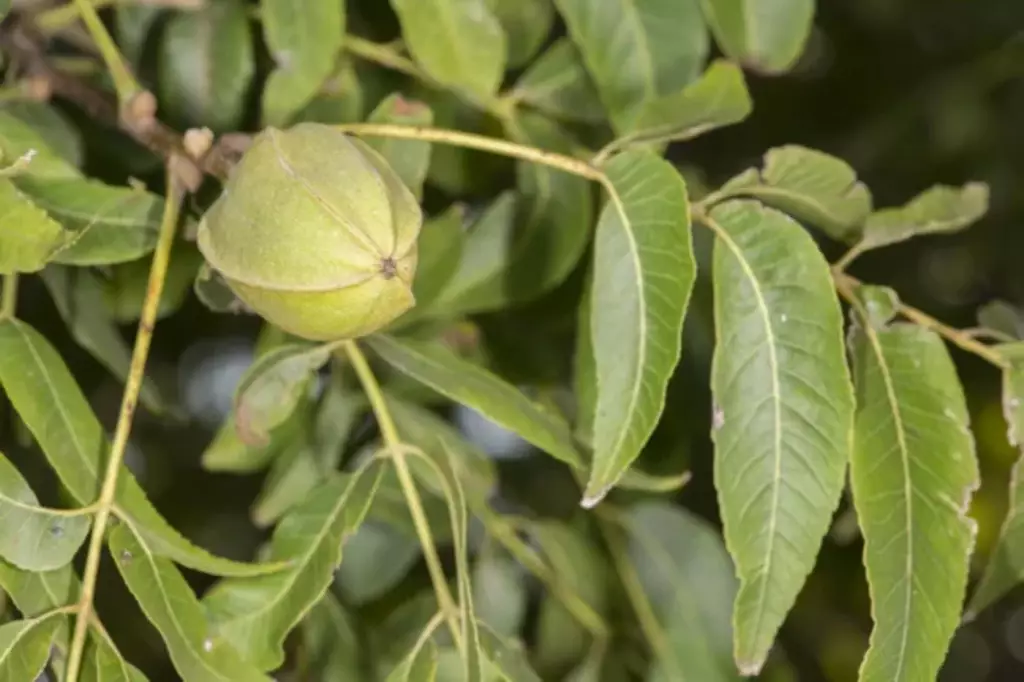
The first few years in their nut production begin anytime between 2 and 10 years. It takes about 7 years for a pecan tree to reach full maturity and begin producing a commercial yield.
After that, the yield increases gradually, and a mature pecan tree can produce up to 150 pounds of nuts per year. However, the yield can be affected by factors such as weather, pests, and diseases.
Decline in nut production due to age
The table below shows the noticeable decline in the estimated yield of pecan trees as they mature:
| Age of Pecan Trees | Nut Production | Estimated Yield Per Tree (lbs) |
|---|---|---|
| Young (1-20 years) | High | 4000 |
| Mature (21 -50 years) | Moderate | 2500 |
| Old (51+ years) | Low | 1000 |
As pecan trees age, their nut production tends to decrease. This decline in productivity is attributed to various factors, including reduced vigor, susceptibility to diseases and pests, and competition for resources within the tree.
Older pecan trees may also experience a decline in overall health, leading to decreased nut yields.
To maintain optimal nut production, pecan growers often implement various management practices, such as pruning, fertilization, and pest control, to prolong the productive lifespan of their trees.
Additionally, some growers may choose to replace older pecan trees with younger, more productive varieties to ensure a consistent and abundant nut harvest.
Differences in the onset and offset of nut production in different pecan varieties
| Pecan Variety | Estimated Onset of Nut Production | Estimated Offset of Nut Production |
|---|---|---|
| Desirable | 6-8 years | 80-90 years |
| Stuart | 4-6 years | 70-80 years |
| Pawnee | 3-5 years | 60-70 years |
| Cape Fear | 4-6 years | 70-80 years |
| Elliot | 4-6 years | 70-80 years |
The Desirabe variety is known for its excellent flavor and large nut size
The Desirable pecan variety is known for its estimated onset of nut production, which typically occurs between 6 and 8 years after planting. The nut production of this variety is estimated to continue until the tree reaches an age of 80 to 90 years.
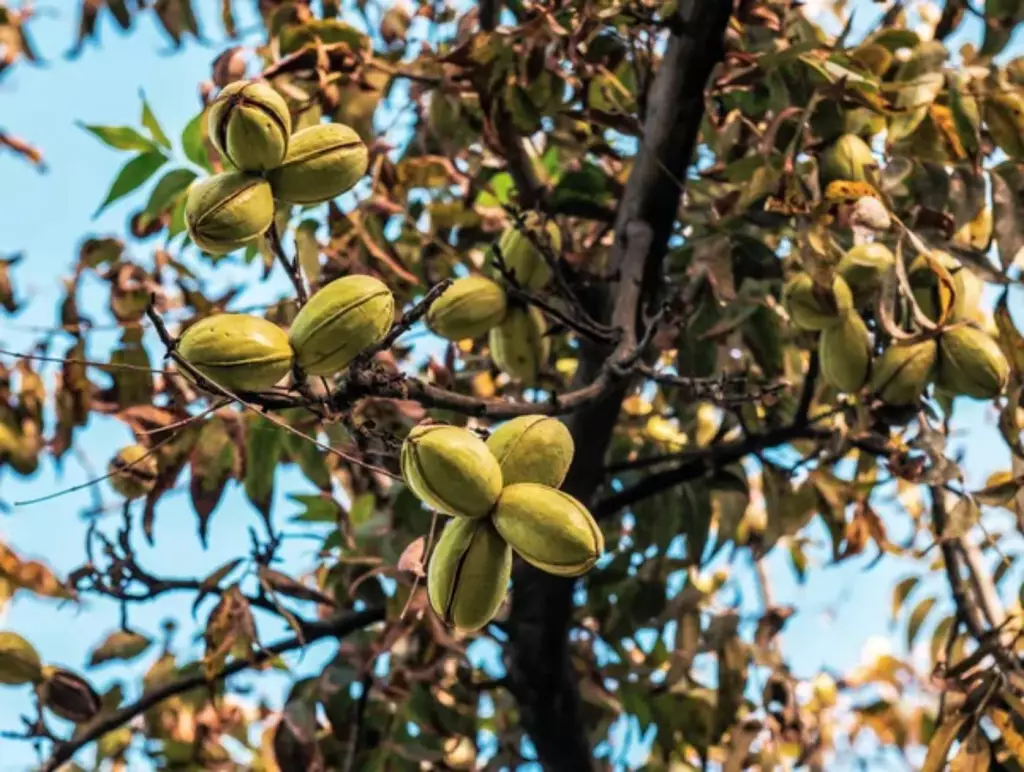
This variety is one of the most well-known and widely grown pecan cultivars in the United States. It is highly valued for its large, high-quality nuts and excellent production characteristics.
The tree is known for its vigorous growth and adaptability to a wide range of soil types and climatic conditions, making it a popular choice for commercial pecan orchards.
In terms of nut production, the Desirable variety is renowned for its large and well-filled nuts. The nuts are typically large in size, with a high kernel percentage, meaning that a greater proportion of the nut is the edible kernel.
This variety is also known for its consistent and reliable bearing habits, often producing high yields of nuts. The nuts themselves have a desirable flavor profile, making them popular in both the domestic and export markets.
Additionally, the nuts have good cracking characteristics, which is important for both commercial processing and home use.
In terms of harvest time, it typically matures in the mid to late season, allowing for a relatively extended harvest period. This can be advantageous for commercial growers who need to manage their harvest and processing operations efficiently.
The Stuart variety is known for its high-quality nut production and reliable yields
The Stuart pecan variety is known for its high-quality nut production. It is a popular choice among pecan growers due to its consistent and abundant yields. The Stuart pecan tree is a large, spreading tree that produces large, thin-shelled nuts with a rich flavor.
Stuart pecan trees are known for their adaptability to a wide range of soil types and climates, making them a versatile choice for commercial pecan orchards. They are also relatively disease-resistant, which contributes to their reliability as a consistent nut producer.
When it comes to nut production, the Stuart pecan variety is valued for its large nut size and high kernel quality. The nuts are typically harvested in the fall, and the tree's ability to produce a high volume of nuts makes it a profitable choice for pecan farmers.
The Pawnee variety is celebrated for early maturity and abundant harvests
The Pawnee pecan variety is a popular choice among pecan growers due to its excellent nut quality and high productivity. It is a Type 1 pecan tree, meaning it sheds pollen first and then receives it, making it an ideal pollinator for Type 2 pecan varieties.
Pawnee pecans are known for their large, plump nuts with a rich, buttery flavor. The kernels are often well-filled and have a high oil content, making them desirable for both fresh consumption and processing.
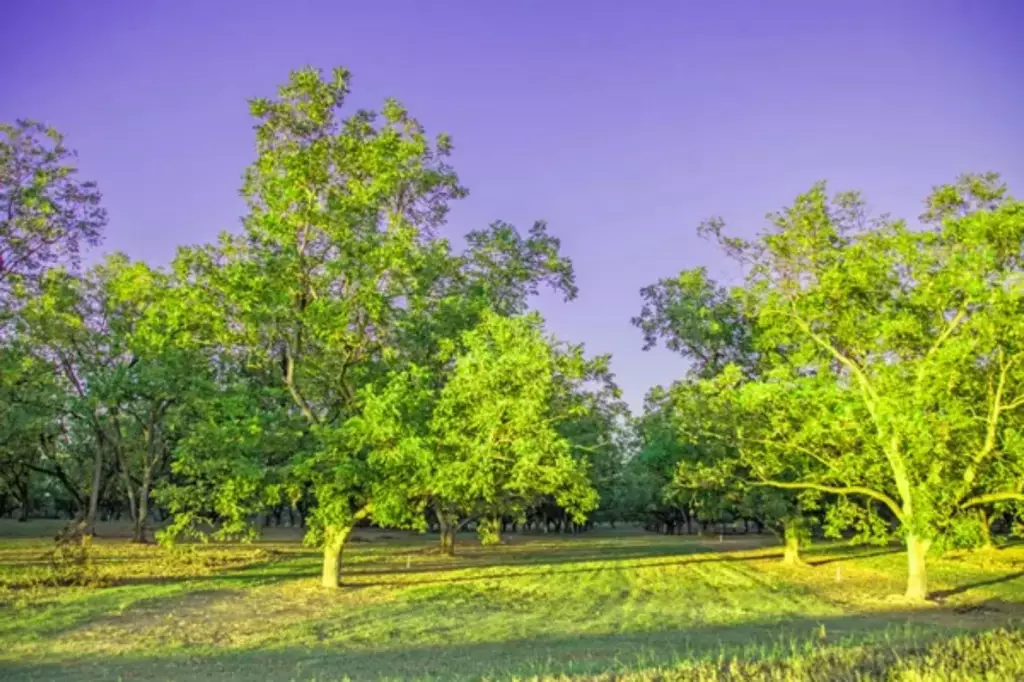
The nuts typically mature in the mid to late season, usually around October, depending on the specific growing region.
In terms of productivity, Pawnee pecan trees are capable of producing nuts at a relatively young age compared to some other varieties.
Under optimal growing conditions, a mature Pawnee pecan tree can yield a substantial crop of nuts each year. With proper care, including adequate irrigation, fertilization, and pest management, Pawnee pecan trees can continue to produce nuts for several decades.
As for the longevity of nut production, Pawnee pecan trees have been known to remain productive for 50 years or more, with some well-maintained orchards continuing to yield high-quality nuts for even longer periods.
The Cape Fear variety is noted for its exceptional disease resistance and adaptability
Cape Fear is a popular pecan variety known for its high-quality nuts and reliable production. This cultivar was developed by the USDA Pecan Breeding Program in Brownwood, Texas, and released in 1984.
Cape Fear pecan trees are well-regarded for their adaptability to various soil types and climates, making them suitable for a wide range of growing conditions.
The nuts produced by this variety are large and oval-shaped, with a thin shell that encases a flavorful kernel. They are prized for their excellent taste and are often used in both culinary and confectionery applications.
The trees typically begin to bear nuts at a relatively young age, making them an attractive choice for commercial orchards and home growers alike.
Once mature, these trees can produce nuts for several decades, with peak production typically occurring when the trees are between 10 and 20 years old.
The Elliot variety is recognized for its rich, buttery flavor and consistent performance
Elliot pecan is a popular variety of pecan trees known for its excellent nut quality and high yields. It is a type-1 pollinator, which means it sheds pollen early in the season, making it an ideal choice for cross-pollinating with other pecan varieties.
The nuts produced by this variety are large and elongated, with a thin shell that encases a flavorful kernel. The nuts are typically harvested in the fall, usually between October and November, depending on the specific climate and growing conditions.
Elliot pecans are prized for their rich, buttery flavor and are often used in various culinary applications, including baking, confections, and snacking.
Typically, Elliot pecan trees start producing nuts around 4-6 years after planting, with full production achieved at around 15 years of age.
Nut Production Factors in Pecan Trees
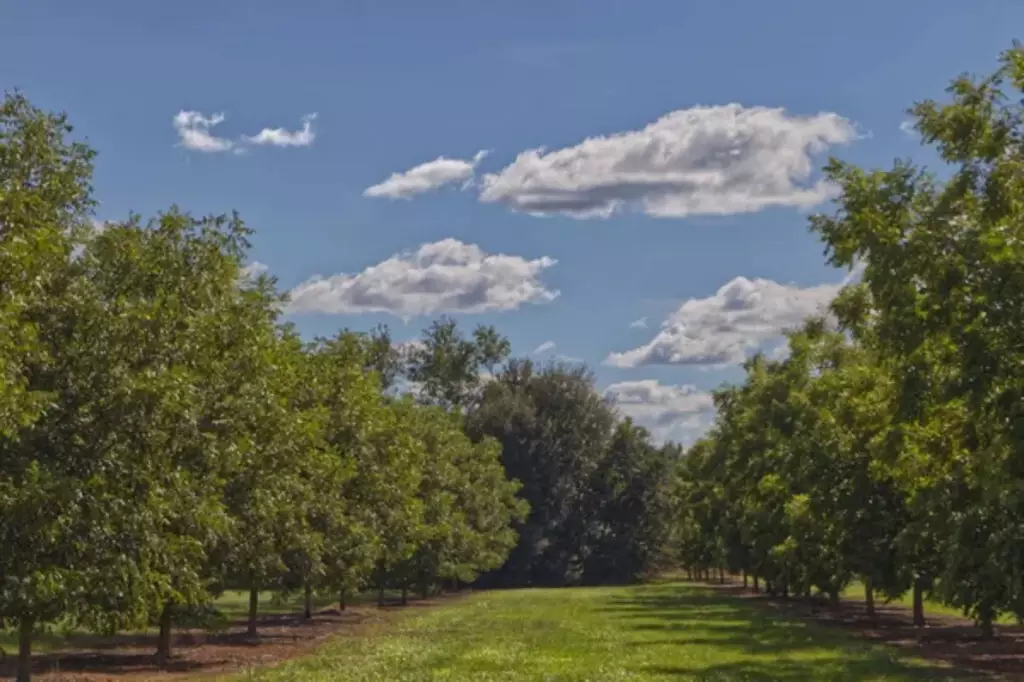
In this section, we will discuss some of the most crucial factors that affect pecan tree nut production.
The age of a pecan tree is a crucial factor in determining its nut yield
Pecan trees can take anywhere from 4-6 years to start producing nuts, and they usually reach peak production between 15 and 20 years of age.
After this, the nut yield may start to decline. However, with proper care and maintenance, some trees can continue to produce nuts for up to 30 years.
The cultivar of a pecan tree can also have a significant impact on its nut yield
Some cultivars are known for their high nut yield, while others may produce fewer nuts. You may need to choose the right cultivar for your needs and ensure that it is well-suited to your growing conditions. For example, some cultivars may require more water than others, while some may be more tolerant of shade.
Environmental factors can also affect nut production
Environmental factors such as water, rain, temperature, weather, sunlight, and shade can all affect the nut production of pecan trees.
Pecan trees require a lot of water, especially during the first summer after planting. However, excessive water can also lead to root rot and other diseases.
Rainfall is also crucial, as drought conditions can reduce nut production. Pecan trees prefer a minimum temperature in the range of 45 to 55 degrees Fahrenheit and like to stay below 80 degrees Fahrenheit.
Sunlight is also essential, as pecan trees require a lot of it to produce nuts. Shade can reduce nut production, so you might want to plant your trees in a location that receives plenty of sunlight.
To know more about the ideal conditions you need to maintain when planting pecan trees, you can check out this article.

